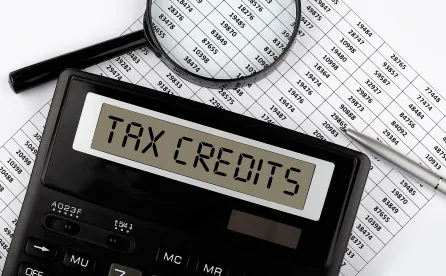The Internal Revenue Service (“IRS”) and Department of the Treasury earlier this week released extensive proposed regulations relating to direct cash payments for certain tax credits pursuant to Section 6417 of the Internal Revenue Code (the “Code”) (the “Proposed Direct Payment Rules”) and transfers of certain tax credits pursuant to Section 6418 of the Code (the “Proposed Credit Transfer Rules”). In each case, taxpayers may rely on the proposed regulations until final regulations are promulgated, and parties interested in commenting on the Proposed Credit Transfer Rules or Proposed Direct Payment Rules before final regulations are issued may submit written comments to the IRS by August 14, 2023.
Additionally, the IRS and Treasury released temporary regulations relating to taxpayer registration requirements with respect to tax credits for which a direct cash payment will be claimed pursuant to Section 6417 of the Code and with respect to tax credits transferred pursuant to Section 6418 of the Code (the “Registration Rules”).
Background to Section 6417 Direct Pay and Section 6418 Transfers
The Inflation Reduction Act (the “Act”), passed in August 2022, allows certain entities, including tax-exempt entities, states and political subdivisions, the Tennessee Valley Authority, Alaska Native Corporations, and Indian tribal governments, to claim a direct cash payment equal to the amount of certain specified credits under new Section 6417 of the Code. This election is available for the production tax credit under Section 45 of the Code (“PTC”), credits under Section 45Y relating to technology neutral PTCs beginning in 2025, the investment tax credit under Section 48 of the Code (“ITC”), credits under Section 48E relating to technology neutral ITCs beginning in 2025, and several other credits. Taxable entities may elect to claim cash payments in lieu of tax credits only with respect to the Section 45Q carbon capture and sequestration credits, Section 45V hydrogen production tax credits, and Section 45X advanced manufacturing production tax credits, and subject to certain limitations provided in the Act. The election must be made no later than the due date for the tax return of the year in which the election is made.
The Act also permits taxpayers to sell all (or a portion of) ITCs, PTCs, Section 45Y PTCs, or Section 48E ITCs (as well as certain other tax credits) to another taxpayer under new Section 6418 of the Code. The election to transfer must be made no later than the due date for the tax return of the year in which the credit is determined (or, for a transfer of the PTC or Section 45Y PTC, for each taxable year during the 10-year period beginning on the date the facility is placed in service). Once made, the election is irrevocable.
To properly sell credits, the buyer must pay for the credit in cash, and the buyer is not allowed to deduct the amount paid for such credit or subsequently transfer the credit. The payment will not be included in the gross income of the seller. Penalties apply for excessive credit transfers.
Proposed Direct Payment Rules
The Proposed Direct Payment Rules provide guidance on a number of issues relating to the direct payment of certain tax credits, including additional detail regarding certain eligible entities, rules relating to how the applicable tax credit amount is determined, clarification regarding how certain taxpayers eligible for credits under Section 45Q, 45V or 45X may elect to claim cash payments under Section 6417, reporting requirements, rules related to reasonable cause to avoid the 20% penalty for excessive credit transfers, anti-abuse rules, and other election mechanics. Among the highlights:
-
Non-profit organizations without federal tax-exempt status are not included as eligible entities under Section 6417.However, eligible entities include the government of any US territory or political subdivision and the District of Columbia. Instrumentalities and agencies of states are also permitted to receive cash payments.
-
Partnership and S corporations are not considered eligible entities permitted to sell ITCs and PTCs, even if all partners or shareholders, as applicable, are otherwise eligible under Section 6417.
-
As expected, the tax credit amount is determined without regard to the restrictions regarding use of property by tax-exempt organizations and government entities, and by treating any property with respect to which such credit is determined as used in a trade or business of the applicable entity.
-
To the extent the eligible entity receives any tax-exempt amounts for the specific purpose of purchasing, constructing, reconstructing, erecting, or otherwise acquiring an investment credit property, such amounts generally do not reduce the amount of cash payments that the eligible entity may receive.
-
If an election is made pursuant to Treasury Regulations Section 1.48-4 to pass through ITCs to a lessee of property, an election may not be made under Section 6417 with respect to such ITCs. In addition, no election may be made under Section 6417(a) for credits purchased pursuant to Section 6418.
Proposed Credit Transfer Rules
The Proposed Credit Transfer Rules provide guidance on a number of issues relating to tax credit transfers, including which taxpayers may transfer credits, rules relating to recapture of certain tax credits, timing for transfers and claiming transferred credits, reporting requirements, rules related to reasonable cause to avoid the 20% penalty for excessive credit transfers, anti-abuse rules, and other election mechanics. Among the highlights:
-
Recapture of any ITCs (and any other tax credits subject to recapture) is taken into account by the buyer. However, the transferor must notify the buyer of any recapture event, the Proposed Credit Transfer Rules expressly permit indemnification relating to recapture of the buyer by the seller, and any recapture event occurring at the partner or S corporation shareholder level of the selling partnership or S corporation, as applicable, would not result in recapture to the buyer.
-
As expected, for partnerships and S corporations that hold a facility or the property giving rise to the credit, the election to transfer credits must be made at the entity level. The Proposed Credit Transfer Rules do not permit individuals partners or S corporation shareholders to sell their allocable share of tax credits.
-
If an election is made pursuant to Treasury Regulations Section 1.48-4 to pass through ITCs to a lessee of property, the ITCs may not be transferred by the lessee. However, the purchaser of property engaged in a sale-leaseback transaction may transfer ITCs to another taxpayer.
-
Expressly permits arrangements using brokers to match eligible selling taxpayers with tax credit buyers, so long ownership of the tax credit does not pass to the broker or other taxpayer prior to being sold to the buyer.
-
For partnerships and S corporations, allows tax-exempt income resulting from a transfer of less than all eligible credits to be allocated to partners or S corporation shareholders, as applicable, that desired to transfer their share of the underlying credits.
-
Confirms that, with respect to a tax credit buyer, there is no gross income to a buying taxpayer when claiming an eligible credit if the amount paid for the eligible credit is less than the amount of the eligible credit transferred and claimed.
-
The passive activity credit rules under Section 469 of the Code would apply to tax credit buyers in determining whether they are eligible to claim purchased tax credits.
-
Provides guidance for taxpayers to establish reasonable cause to avoid imposition of the 20% penalty with respect to excessive credit transfers.
Registration Rules
The Registration Rules adopt a pre-filing registration process for eligible entities intending to claim direct cash payments pursuant to Section 6417 of the Code and to sellers engaged in tax credit sales pursuant to Section 6418 of the Code. In connection with the pre-filing registration process, each taxpayer required to register will be required to provide certain information through an electronic registration process through an IRS portal, including the identity of the applicable taxpayer, all applicable credits with respect to which it intends to claim cash payments or sell, and each applicable credit property that contributed to the determination of such credits. These pre-filing registration procedures are intended to permit the IRS to prevent duplication, fraud, improper payments, or excessive payments. In each case, upon completion of the pre-filing registration process, the applicable electing party (either the direct payment claimant under Section 6417 of the Code or the seller of tax credits under Section 6418 of the Code) will be provided with a registration number that it will be required to include on its tax return claiming the direct cash payment or identifying the transferred tax credit, as applicable. In the case of tax credit transfers under Section 6418 of the Code, the buyer taxpayer will be required to include the applicable registration number in connection with claiming the applicable transferred credit.





 />i
/>i

